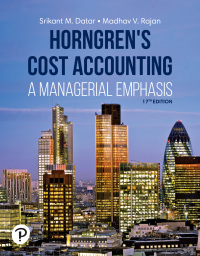Question
In its first year of operations a company produced and sold 70,000 units of Product A at a selling price of $20 per unit and
In its first year of operations a company produced and sold 70,000 units of Product A at a selling price of $20 per unit and 17,500 units of Product B at a selling price of $40 per unit. Additional information relating to the companys only two products is shown below:
| Product A | Product B | Total | |
|---|---|---|---|
| Direct materials | $ 436,300 | $ 251,700 | $ 688,000 |
| Direct labor | $ 200,000 | $ 104,000 | $ 304,000 |
The company created an activity-based costing system that allocated all of its manufacturing overhead costs to four activities as follows:
| Activity Cost Pool (and Activity Measure) | Manufacturing Overhead | Activity | ||
|---|---|---|---|---|
| Product A | Product B | Total | ||
| Machining (machine-hours) | $ 213,500 | 90,000 | 62,500 | 152,500 |
| Setups (setup hours) | 157,500 | 75 | 300 | 375 |
| Product design (number of products) | 120,000 | 1 | 1 | 2 |
| Other (organization-sustaining costs) | 117,000 | NA | NA | NA |
| Total manufacturing overhead cost | $ 608,000 | |||
If the company uses a traditional cost system that relies on plantwide overhead allocation based on direct labor dollars, what is the total gross margin (or product margin) earned by Product B?
Multiple Choice
-
$136,300
-
$146,300
-
$163,600
-
$153,600
Step by Step Solution
There are 3 Steps involved in it
Step: 1

Get Instant Access to Expert-Tailored Solutions
See step-by-step solutions with expert insights and AI powered tools for academic success
Step: 2

Step: 3

Ace Your Homework with AI
Get the answers you need in no time with our AI-driven, step-by-step assistance
Get Started


